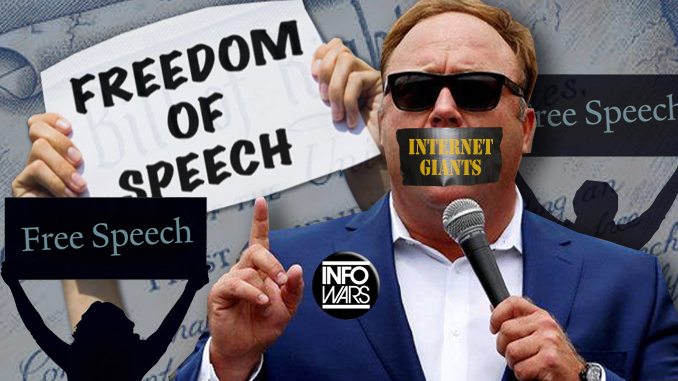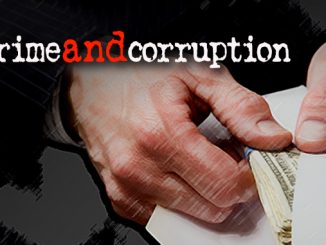
Social media’s attack on “Infowars” and Alex Jones has spurred the usual partisan debate rather than genuine dialogue. But, like him or not, the banning of anyone harms free expression for everyone.
By S.T. Patrick
In what may prove to be the best possible situation for Infowars and Alex Jones as brands, fiery talk show host Jones and his content have been banned from Facebook, Apple podcasts, YouTube, Stitcher Radio, Spotify, LinkedIn, and Pinterest. After Apple removed the podcasts because it “doesn’t tolerate hate speech,” downloads of the Infowars app on the iPhone app store reportedly skyrocketed.
Twitter has chosen to piecemeal its censorship. It has recently applied a one-week tweeting ban to Infowars and Jones. When the piling on began, Twitter CEO Jack Dorsey defended not banning Jones and Infowars altogether.
“The reason is simple,” Dorsey said. “He hasn’t violated our rules.”
While Twitter’s decision may just be a slower, more careful path that leads to an eventual full ban, Dorsey was correct that these sorts of bans should emanate from guidelines that are unemotional. The domino effect that occurred once the bans began also signaled some sort of permission and empowerment that began with the Facebook ban. The smaller multi-national social media corporations followed the lead of their Big(ger) Brother.
Immediately after the bans were enacted, the debates became discombobulated. Mimicking any current dialogue on the Trump administration, the political right became angered and wanted revenge as the political left became celebratory with the glee of a conquering tribe. Those two reactions are the only ones Americans seem to exhibit since the 2016 presidential election. The reactions oscillate between the two camps in accordance with the latest Trump tweet, administrative policy announcement, or Mueller indictment.
Talk radio and partisan cable news have created a political environment steeped in absolute equality rather than ideology. If a Republican politician is criticized for opening a dialogue with a former enemy, the self-assigned duty of conservative talk radio hosts is to provoke the indignation of its audience by giving three examples of a Democrat engaged in the same action without such public criticism. When a liberal cable news network is criticized for its blatant partisanship, the response of its supportive viewers will be to point out the coverage bias of the conservative network. In the former, the pros and cons of opening the dialogue is secondary to pointing out hypocrisy. In the latter, a serious examination of one network is ignored while the other network exists. Pointing out hypocrisy is the contemporary way to absolve an organization or an ideology from moral, political, sociological, and environmental wrongs.
The Infowars and Jones bans should have instantly spurred two national discussions: the right and responsibility of social media companies (based on communication of beliefs and ideologies) to censor those same ideas and the right of a private company to serve only consumers it chooses while banning others.
Leftists and mainstream Republicans who have defended Jones have been clear to point out that they don’t like him or don’t listen to him. This near-mandatory preface to the support of free speech also stems from a confused political environment where to back a concept or an idea is synonymous with backing the person, and to attack a concept or idea is to attack the person. In a political discussion that is open and honest, discussion of free speech could and should be had without having to detach oneself from any support of Jones.
MIT professor, self-proclaimed anarchist, and free-speech activist Noam Chomsky wrote, “What I’ve seen of what he does is outrageous, but unlike many civil libertarians here and especially in other countries, I don’t think that the right way to deal with ‘hate speech’ and crazed fabrications is to ban them; rather, to confront them, and to seek and confront the reasons why anyone pays a moment’s attention to them.”
The power of the people certainly resides in its ability to freely consume or avoid entertainment or information. Before begging for censorship from opinions that may offend or anger, one should exercise the power button on the technology that serves as the conduit. Turn off the television, change the radio station, un-follow the page on Facebook, and refuse to subscribe to a Jones podcast on iTunes.
Censorship feeds some psycho-emotional need to be right. If an entity is censored, the opponents of that entity feel validated in their ideologies. But what if the slippery slope argument is legitimate and all ideologies are at risk when one is at risk?
In discussing the pressure being put on some retailers such as Amazon not to carry some controversial books, Joseph Green, a free-speech purist who hosts “JoeGreenJFK.com,” wrote about the value of the better alternative books in 2016. “But we cannot have those books if we deny people the right to think, and write, in the public sphere. It is the cost of doing business in a free republic.”
Political science professor Joseph Uscinski told Global News, “The big corporations and the big government have censored (Jones’s) ideas. It’s only going to make them more alluring.”
The effects of the Jones censorship are multilayered. Will Jones have to tone down the screaming, frothing, and crying that emphatically dramatizes what can sometimes be good anti-authoritarian questions? Do the censorship’s effects on downloads of the Infowars app encourage Jones to go further? Will a real discussion be had regarding the relationship between liberal big tech CEOs and conservative consumers? Do the divisions caused by censorship debates take away attention from the violations of privacy rights, worker exploitation, and sexism that have plagued big tech?
The banning of Jones and Infowars can be explained away as an opening salvo to ban rabid Trumpism. A scarier, more worrisome explanation may be that it is the first open door to Euro-style censorship of ideas that many find offensive and uncouth. If either liberals or conservatives allow big tech companies to become the arbiters of those bans, everyone’s voice becomes a little more silent with every axe that falls.
S.T. Patrick holds degrees in both journalism and social studies education. He spent 10 years as an educator and now hosts the “Midnight Writer News Show.” His email is [email protected].




